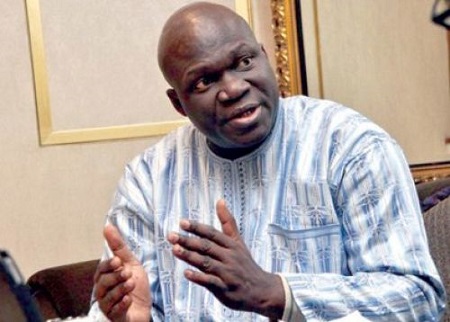Entertainment
JAMB And The Politics of Cut-Off Marks – Reuben Abati
Ex presidential aide and popular Nigerian writer, Reuben Abati has reacted to the controversial reduction of cut-off marks for Nigerian tertiary institution’s admission processes.
I have followed with keen interest the controversy over the announcement of cut-off marks for Nigeria’s admission processes for the 2017/2018 session, with many commentators and the general public insisting that it is unwise, insensitive and retrogressive, to reduce the cut off mark for admissions into our tertiary institutions: 120 for universities, 100 for polytechnics and monotechnics, and a tentative 110 for Innovative Enterprise Institutions (IEIs). Whereas the complaint has been that there is a dumbing down and lowering of standards, which is of course an obvious reaction, I argue that there is need for a better understanding of the context in which the decision was taken in the hope that this would shed some light on this controversial matter.
I write as a reporter and as a stakeholder who attended the 2017/2018 Policy Meeting on plans and modalities for the conduct of admissions into tertiary institutions in Nigeria at the Andrews Otutu Obaseki Auditorium, National Judicial Institute in Abuja, on August 22. The meeting started on Sunday, August 20, 2017. On Monday, August 21, there was a special session for admissions officers of all tertiary institutions in Nigeria.
There are 524 tertiary institutions in Nigeria (minus the IEIs) and every institution was represented on Monday and again on Tuesday, when a special policy session was held and decisions were taken at a combined session of Registrars and Vice Chancellors, Provosts and Rectors. The Obaseki Auditorium was filled up at this meeting, which was attended by over 1, 600 stakeholders in the education sector. In other words, it was a meeting of stakeholders and the decisions were decisions taken by all tertiary institutions in Nigeria. It is therefore wrong to accuse JAMB or report that it is JAMB that is fixing cut-off marks for university admissions.
I recall that at the meeting, when we were about to go into the policy making session, the Minister of Education had to excuse himself on the ground that he had other commitments; all JAMB officials were also asked to leave the hall. The JAMB Registrar explained that he wanted the heads of tertiary institutions to be the ones to take the decisions, not JAMB, not the Minister, and he didn’t want either the Minister or his own staff in attendance so nobody would turn around to accuse JAMB or the Ministry of Education of imposing decisions on the tertiary institutions.
There were other stakeholders in attendance, the heads of the National University Commission (NUC), TETFUND, the National Board for Technical Education (NBTE), National Commission for Colleges of Education (NCCE), NECO, NYSC and the West African Examinations Council (WAEC) – all as observers. The heads of IEIs stayed away from this particular meeting because they had earlier informed JAMB that the heads of other tertiary institutions are in the habit of out-voting and outnumbering them at policy meetings and they would rather have their own separate meeting to serve their own interests. I concluded, there and then, that students’ admission into tertiary institutions in Nigeria has become big business and politics, with stiff competition between public and private institutions.
This clarification is necessary because as I see it, some of the participants in that meeting have since gone on a holier-than-thou expedition to distance themselves from it. At the meeting, the JAMB Registrar repeatedly pointed out that the University of Ibadan had made it clear that its cut-off mark would never go below 200. There are other universities like that, including the University of Nigeria, Nsukka, and the University of Ilorin. I am surprised however that there has been so much uncomfortable hypocrisy from some universities that attended the meeting. The Vice Chancellor and the Registrar of the Afe Babalola University, Ado-Ekiti were both in attendance and the former spoke enthusiastically in support of the decisions. Yes, the ABUAD VC was there, but curiously, his employer, the proprietor and founder of the Afe Babalola University was the first person to denounce the decisions. We should take special notice however, of the intervention of the Vice Chancellor of the Tai Solarin University of Education, Professor Oluyemisi Obilade, and Professor Femi Mimiko. Out of over 1, 600 participants at a policy meeting, only two persons are standing up to report the truth?
The objectives of that policy meeting were inter alia, to brief the Degree, National Certificate in Education and National Diploma-awarding institutions on the plans and modalities for the conduct of the 2017/2018 admissions exercise, introduce the Central Admissions Processing System (CAPS), seek the cooperation and understanding of stakeholders, discuss and agree on submissions of estimated intakes and compliance with the current prescribed quota from the NUC, NCCE, and NBTE, adherence to institutional/programmes cut off marks, compliance with entry requirements, procedure for selection of candidates who may not be admitted at their first choice institutions, adherence to admissions schedule as approved at the Policy meeting and implementation of the science-arts ratio. These issues were tabled, discussed, voted upon and decisions were taken. The states and private tertiary institutions were exempted from the last criteria, to be determined by their proprietors.
It is important to understand the three main backgrounds to this policy meeting. At a similar policy meeting held on June 2, 2016, the various stakeholders at this same 2017 meeting, had adopted 180 as the minimum cut-off mark for admissions to all tertiary institutions in Nigeria. The regulator’s subsequent discovery is that most of the tertiary institutions did not respect this decision. They admitted students who scored below 180 and never reported same to JAMB; they introduced all kinds of back-door schemes and programmes under which admissions were offered.
In effect, the admissions process into Nigerian tertiary institutions was compromised; standards were violated. JAMB therefore decided that every institution must declare a lowest cut off point for its programmes and that every admission must be properly reported and documented, and brought to the notice of the regulator in order to enforce standards and have accurate statistics for educational planning. I got the impression for example, that some higher institutions must have been admitting all kinds of persons who did not have basic qualifications and never passed through the central admissions body. It is curious, isn’t it, that the same schools that voted for 180 in 2016, are now asking for 120, 110 and 100?
Secondly, the evidence was provided to the effect that many tertiary institutions do not respect the admission quota in line with the Federal Character prescribed by the Constitution. Most universities simply admit students from their catchment areas and ignore students from other parts of the country. Bayero University, to cite a notable example, admits over 50% of its students from Kano state, and yet it is a Federal University. Even when students from other parts of the country who apply to such universities have high, qualifying scores, they are ignored.
Thus, every year, many qualified students from different parts of the country are left stranded. They miss the opportunity to go to university not because they are not qualified, but because they have been shut out by the politicization of education in Nigeria. To correct this mischief, JAMB has now created a second tier admissions platform called the Central Admissions Processing System (CAPS). It is an admissions-market where students who have been rejected by their first choices can seek alternatives, where JAMB can help rejected candidates seek other offers, and every institution can go in search of qualified candidates who may have been rejected elsewhere. This is to help increase the admissions ratio in the country, reduce the politicization of admissions, check the exodus of Nigerian students to foreign universities, create more opportunities and ensure greater equity. The only ouster clause in this arrangement is that at the end of the day, the candidate is free to reject any offer that he or she does not find acceptable, and that has no limit whatsoever.
JAMB in its explanation further recognized that ordinarily, a school certificate result should be enough requirement for admission to tertiary institutions as is the case in many countries of the world. In order to raise standards, Nigeria has a system whereby secondary school graduates still have to sit for UTME conducted by JAMB and Post-UTME, further testing conducted by the tertiary institutions, and confront other unwritten hurdles. The higher education seeker in Nigeria is thus taken through greater rigour than similar applicants elsewhere. In 2016, the Policy Meeting on Admissions had banned further conduct of the Post-UTME to reduce the burden faced by Nigerian students. At the 2017 meeting however, the Minister of Education, Mallam Adamu Adamu lifted the ban, noting that the tertiary institutions deserve the independence they have always asked for over their admissions process.
Indeed, this was the main point of the August 22 meeting. Tertiary institutions in Nigeria are the ones to determine their own admissions process. Cut off marks are to be fixed by the Senate of each institution, not JAMB. What JAMB has created through the CAPS is an open market that empowers admission-seekers, promotes healthy competition and provides an avenue for students to raise queries when they feel they may have been short-changed. The insistence on reporting is to aid transparency and data collection, we were told.
If this works, in no time, every tertiary institution will establish its own brand equity. As is the case elsewhere, the labour market in Nigeria will soon begin to differentiate between the students who graduated from a school that admits with 100 over 400 marks and another school whose cut off mark is as high as 250, in the same manner in which there is a marked difference in the UK between a graduate of Metropolitan University and a graduate of the Universities of Oxford and Cambridge. This differentiation in quality and standards is perhaps long-needed in the Nigerian education market.
That is as far as the meeting went, and the report of what I saw and heard. My real concern, and a probable justification for the outcry over the reduction of cut–off marks below the average score is, however, traceable to the fact that Nigeria’s education system is now terribly commercialized and unequal. The law of supply and demand is probably at the root of the politics of cut-off marks. We have more than 524 institutions looking not for students but customers! Ordinarily, most students want to attend elite schools and the Federal institutions, which charge subsidized fees. For instance, Federal Universities charge as low as N35, 000, the state universities about N150, 000-N200, 000, and the private universities as much as N750, 000.
The competition for space in the schools with lower fees is much higher, often leaving the ones with expensive school fees with fewer applicants. While the more economically attractive schools can afford to have high cut off marks, it is not impossible that lower cut-off marks would attract more students to the less patronized schools! The implication is not far to seek. Beyond the policy meeting of August 22, and all expressed good intentions, and regardless of the choice of the stakeholders, therefore, JAMB’s next and biggest challenge, in my view, is to ensure that market forces do not ultimately subvert quality and standards in the tertiary education sector. It is also up to parents to determine the kind of school that they want their children to attend, and for every institution to choose between mediocrity and excellence.
***
Written by Reuben Abati
Follow us on social media:













